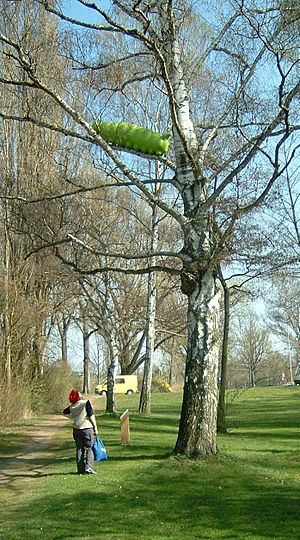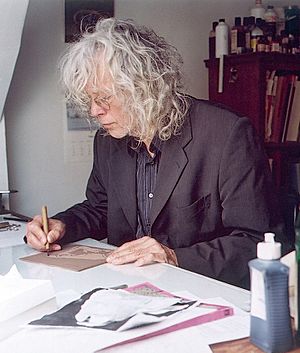F. K. Waechter facts for kids

Friedrich Karl Waechter (born November 3, 1937, in Danzig – died September 16, 2005, in Frankfurt) was a famous German artist. He was known for his amazing cartoons, funny stories, and plays. He created many popular children's books that encouraged kids to be creative and join in the fun.
Contents
A Creative Life
Friedrich Karl Waechter was born in Danzig. His father was a teacher. After World War II, his family moved across the Baltic Sea and settled in Sahms, Germany.
Early Art and Satire
Friedrich went to school in Ratzeburg. There, his talent for drawing became clear. He then studied graphic art in Hamburg. In 1962, he moved to Frankfurt. He started drawing cartoons for an advertisement magazine called Die Zeit.
His drawings caught the eye of the people starting a new satire magazine called Pardon. Satire uses humor, irony, or exaggeration to make fun of people's mistakes or foolishness. They asked Waechter for his ideas. His helpful suggestions earned him a job with the new magazine.
While working at Pardon, he helped start a group called the Neue Frankfurter Schule. This group included many talented cartoonists and writers. They loved creating funny and silly stories. Their work often appeared in Pardon's "Welt in Spiegel" (meaning "In the Mirror") section.
Writing for Kids
By 1970, Waechter became a father. He started writing books for children. Many of these books were special because they asked readers to join in. Kids could complete puzzles, draw, write in the book, or even cut parts out!
His books were popular with both kids and adults. They showed off his amazing art skills. He used simple, clear cartoons, detailed pen drawings, collages, and realistic paintings. He wrote about 40 books in his lifetime. Some famous ones include Anti-Struwwwelpeter (a funny version of a classic German children's book) and Der Kronenklauer (meaning "The Crown Snatchers"), which was a story about not always following rules.
Later Work and Legacy
In 1979, he helped create another funny magazine called Titanic. His cartoons were a regular part of this magazine until 1992. After that, he spent more time teaching, writing books, and creating plays.
Waechter's last work was a book called Vollmond (meaning "Full Moon"). It was a fantastic story about a journey into space. He finished this book while he was getting treatment for lung cancer. Friedrich Karl Waechter passed away on September 16, 2005, at 67 years old. He left behind his wife and three sons.
Awards and Honors
Friedrich Karl Waechter received many awards for his work:
- 1975: Deutscher Jugendliteraturpreis (German Youth Literature Prize) for Wir können noch viel zusammen machen
- 1983: Brüder-Grimm-Preis des Landes Berlin
- 1993: Hessischer Kulturpreis
- 1999: Deutscher Jugendliteraturpreis (German Youth Literature Prize) for Der rote Wolf
- 2003: Alex-Wedding-Preis
- 2003: Preis der Binding-Kulturstiftung
Books by F. K. Waechter
Here are some of the books Friedrich Karl Waechter wrote:
- Ich bin der Größte, 1966
- Die Wahrheit über Arnold Hau, 1966 (with F. W. Bernstein and Robert Gernhardt)
- Der kleine Zweckermann, 1969
- Der Anti-Struwwelpeter, 1970
- Die Kronenklauer, 1972 (with Bernd Eilert)
- Tischlein deck dich und Knüppel aus dem Sack, 1972
- Brülle ich zum Fenster raus, 1973
- Wir können noch viel zusammen machen, 1973
- So dumm waren die Hebräer, 1973
- Das Ungeheuer-Spiel, 1975
- Opa Huckes Mitmach-Kabinett, 1976
- Schule mit Clowns, Der Teufel mit den drei goldenen Haaren, Pustekuchen (1975/76)
- Die Bauern im Brunnen, 1978
- Wahrscheinlich guckt wieder kein Schwein, 1978
- Kiebich und Dutz, 1979
- Die Reise, 1980
- Es lebe die Freihei..., 1981
- Fühlmäuse, 1981
- Wer kommt mit auf die Lofoten?, 1982
- Das Grundgesetz für die Bundesrepublik Deutschland, 1982
- Männer auf verlorenem Posten, 1983
- Nur den Kopf nicht hängen lassen, 1983
- Glückliche Stunde, 1986
- Die Mondtücher, 1988
- Mich wundert, daß ich fröhlich bin, 1991
- Die letzten Dinge, 1992
- Da bin ich, 1997
- F. K. Waechters Erzähltheater, 1997
- Der rote Wolf, 1998
- Mein 1. Glas Bier, 1998
- Der Kleine im Glaspott, 1999
- Die Geschichte vom albernen Hans, 2000
- Der Frosch und das Mädchen, 2000
- Steinhauers Fuß, 2001
- Die Schöpfung, 2002
- Waechter, 2002
- Prinz Hamlet, 2005
- Vollmond, 2005
Plays by F. K. Waechter
Here is a selection of plays he wrote and directed:
- Die Beinemacher (1974)
- Der Teufel mit den drei goldenen Haaren (1975)
- Die Bremer Stadtmusikanten (1977)
- Die Reise nach Aschenfeld (1984)
- Ausflug mit Clowns (1985)
- F. K. Waechters Ixypsilonzett (1990)
- Die letzten Dinge (1992)
- Die Eisprinzessin (1993, in two versions)
- Prinz Hamlet (1995)
- Lysistrata (after Aristophanes, 1997)
- Die Aschenputtler (1998)
- Tristan und Isolde (2002)
- Karneval der Tiere (2002)
- Der Narr des Königs (Kwast) (2003)


